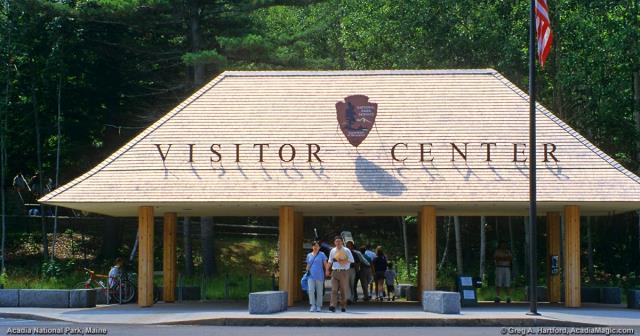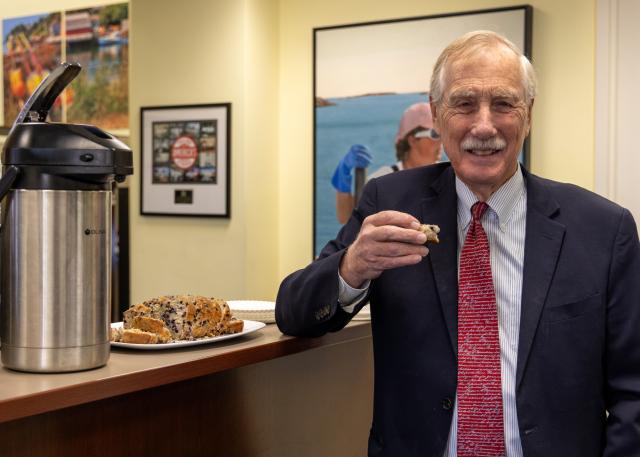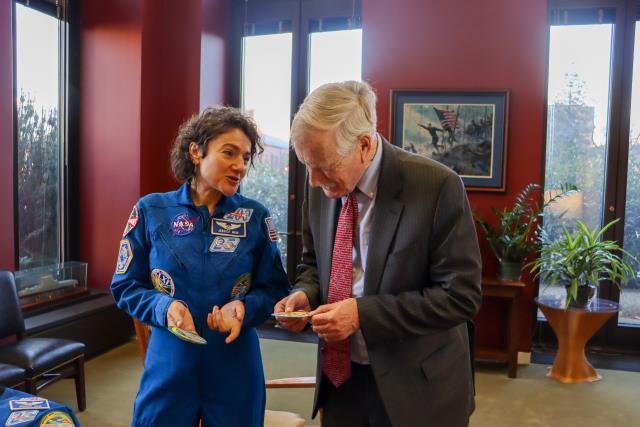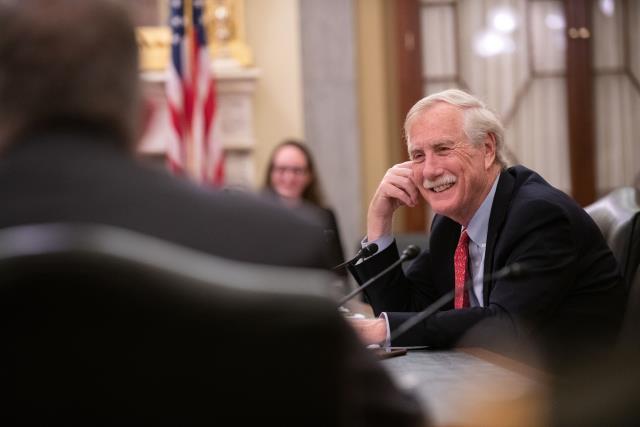|
__________________________________________________________________
Bill Allowing Electronic Duck Stamps Signed into Law

From Bean Boots to Old Town Canoes, generations of Maine people have pioneered innovations to make getting outdoors easier. Decades later, this same commitment drives sportsmen and women across our state and is the guiding principle of the Congressional Sportsmen’s Caucus.
That's why I was proud to cosponsor legislation that streamlines the duck stamp process for Maine hunters. The Duck Stamp Modernization Act of 2023 embraces 21st century technology to make the great outdoors more accessible than ever.
All waterfowl hunters at or over the age of 16 must possess a current signed Federal Duck Stamp, along with state licenses and permits, to hunt legally. The Duck Stamp Modernization Act of 2023 builds off a successful pilot program in 28 states that offer E-Stamps for 45 days of hunting. Along with the digital access, physical Duck Stamps would still be available for purchase from the post office and other authorized retailers.
Providing access to the stamp on smartphones will help more people enjoy waterfowl hunting, remove barriers to getting outdoors, and increase revenue for conservation programs funded by stamp sales.
Urging the VA to Implement Wi-Fi at Outpatient Clinics

This month I joined the entire Maine congressional delegation to urge the Department of Veterans Affairs (VA) to install Wi-Fi at Maine's eight Community-Based Outpatient Clinics (CBOCs).
Technology plays a critical role in providing healthcare in Maine, especially given the remoteness of many areas. The need for guest Wi-Fi impacts the veteran experience at VA Maine by limiting their ability to self-check in and do travel benefit forms via the “My HealtheVet” portal to reduce wait times. Staff Wi-Fi would increase time spent with veterans. Furthermore, access to the internet can be a service for patients and visitors who are in a facility for multiple appointments
Our letter urged the VA to immediately update the delegation on the status of the Department of Veterans Affairs’ NEXTGEN initiative to ensure Wi-Fi at all CBOCs in Maine given that none have public Wi-Fi. Calais and Lincoln have no employee Wi-Fi whatsoever; and Caribou, Portland, Bangor, and Lewiston only have limited Wi-Fi for staff.
It is clear that Wi-Fi services in all CBOCs will improve staff efficiency and veterans' experience, by allowing a model of care where staff members move from room to room using laptops connected to Wi-Fi to treat the veterans.
The full letter can be found here.
_______________________________________________________________________
Honoring Majority Leader George Mitchell

This month, I worked with my friend Senator Collins to introduce legislation honoring former Majority Leader U.S. Senator George Mitchell. The bill would designate the Hulls Cove Visitor Center at Acadia National Park as the “George J. Mitchell, Jr., Visitor Center”.
George Mitchell has dedicated his life to public service, working across all three branches of federal government, in pursuit of a more perfect union. Throughout his career, George Mitchell has largely embodied the character of our state motto — Dirigo — a leader working to resolve conflicts here in the United States and around the world.
Renaming the Acadia National Park Visitor Center after Majority Leader Mitchell will remind Maine people and tourists alike what it means to give back, tackle hard challenges, and overcome the odds in an effort to provide a better future for generations to come.
Combatting Cross-Border Money Laundering

Our current response to cracking down on illicit cross-border trade is broken, and siloed departments are creating gaps for money launderers and other criminals to slip through.
The Combating Cross-Border Financial Crime Act of 2023 would establish a Cross-Border Financial Crime Center within the Department of Homeland Security that coordinates information sharing, so federal law enforcement can work seamlessly with state, local and international partners to fight crime, terrorism and the financial structures that enable them.
Currently, the United States and its global partners have a 99 percent failure rate when attacking the financial networks of transnational criminal organizations. As a result, massive illicit proceeds flow through the U.S. financial system each year, totaling approximately $466 billion in 2021. These illicit funds enable transnational criminal organizations, kleptocrats, tax evaders, and terrorists to expand their empires and undermine American national and financial security.
The new center would be located within the lead criminal investigation arm of the Department of Homeland Security, Homeland Security Investigations (HSI). HSI is well-positioned to house and operate the Center because the agency has unique access to the cross-border trade data required to combat trade-based money laundering. The Cross-Border Financial Crime Center Act also provides stable funding for the Department of Homeland Security’s Trade Transparency Units (TTU) program. The TTU program prevents criminal actors from exploiting international trade and financial infrastructures by establishing agreements with partner nations to share import-export data.
Happenings Around Town

Enjoying some homemade Maine blueberry bread with constituents visiting down in Washington
There is no better way to start the morning than with a hot cup of coffee, homemade Maine blueberry bread and visiting with people from across Maine. Thanks to all who joined me in D.C. for Capitol Coffee this year. I hope to see you all in 2024!

Speaking with Caribou native, and NASA Astronaut, Jessica Meir
Maine people like Astronaut Jessica Meir are paving the way--here on earth and up in space--in science, research, and technology. It was an honor to sit down with Jessica, hear about her visit to the International Space Station, and discuss what her work means for all humankind.

Spending time with George Stevens Academy students for Capitol Class
One of the best parts of the job is when I get to teach a Capitol Class with students in Maine. This month, I joined George Stevens Academy in Blue Hill to talk about the role of Congress, what a day in the life of Senator looks like and other important news of the day. I had the best time engaging with our bright young Maine students and was so impressed by their fantastic questions.
December Policy Update

As a reminder, you can read more on my regularly updated press release page at king.senate.gov. Here are some other priorities I’ve been working on.
- Announcing $1 Million for Maine Agricultural Producers. Maine is known throughout the country for our wild blueberries, potatoes, dairy, and many other wonderful agricultural products. These investments will help diversify our state’s homegrown products, making them more accessible and appealing to consumers. Read more HERE.
- Introducing Legislation to Protect Rural Seniors' Access to Healthcare. I joined a bipartisan group in introducing the Protecting Rural Seniors’ Access to Care Act. This legislation would prohibit the U.S. Department of Health and Human Services (HHS) Secretary from finalizing a proposed nursing home staffing rule that would hurt facilities across Maine and could force many to close. Read more HERE.
- Pressing for an Independent Investigation in the Lewiston Events. Together with the Maine congressional delegation, I sent a follow-up letter to the Inspector General of the U.S. Department of the Army, Lieutenant General Donna W. Martin, to further press for a comprehensive review of the facts leading up to the October 25 mass shooting at Just-In-Time Recreation and Schemengees Bar & Grille in Lewiston. Read more HERE.
- Curbing Pollution Threat Posed by Foam Containers. I introduced bicameral legislation to phase out single-use plastic foam food service products, “loose fill” such as packing peanuts, and non-medical disposable coolers – materials known to cause adverse health effects and pollute waterways. Read more HERE.
- Condemning Hamas’ Use of Rape During October 7th Terrorist Attack on Israel. Senator Collins and I joined a bipartisan resolution condemning Hamas for using sexual and gender-based violence as a weapon of war against Israelis during the October 7th terrorist attack. Read more HERE.
- Demanding VA Better Protect Veterans from Prescription Opioid Abuse. I called on the Department of Veterans Affairs (VA) to step up its efforts to protect veterans from prescription opioid abuse as roughly 80% of non-VA prescription opioid providers failed to complete the VA’s opioid safety training in 2021. Read more HERE.
Hearing Highlights
This month, the Senate Energy and Natural Resources Subcommittee on Public Lands, Forests and Mining, I questioned Dr. Steve Feldgus, the Deputy Assistant Secretary of Land and Minerals Management and Mr. Rich Haddock, about the changes needed in America’s bureaucratic, time-consuming permitting process to achieve the historic clean energy opportunities presented by the landmark Inflation Reduction Act.
Lithium is one of the most commonly used critical minerals in the manufacturing of electric vehicles (EVs). Currently, it can take more than a decade to obtain a mining permit for this critical mineral in the United States.
In The News

Thanks for subscribing to my monthly newsletter! I would love to hear your ideas for how we can make Maine and our country a better place. Please feel free to reach out with any questions, comments, or concerns by visiting: https://www.king.senate.gov/contact –we look forward to hearing from you.
All the best!

To unsubscribe to this e-Newsletter click HERE.
|